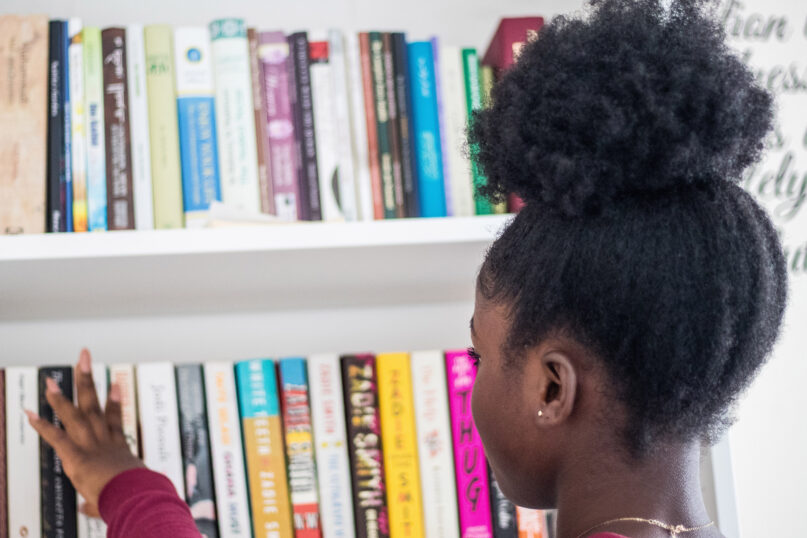(RNS) — With the close of Women’s History Month and the start of Black Women’s History Month in April, there have been numerous discussions about how women can better support one another. We have celebrated the triumphs of women, while marking the challenges that remain.
This has led me to ask how Christian women can support young girls who’ve not yet entered womanhood and those in the “in-between” space of adolescence. As the executive for racial justice at United Women in Faith, I have spent considerable time thinking about the ways — big and small — that our society and our church fall short in supporting Black girls in our communities.
Certainly, there are Black women academics and advocates (Monique Couvson, formerly Monique Morris, and Brittany K. Barnett, Ellen Reddy and Kimberlé Crenshaw, to name a few) who have made it their life’s work to uplift Black girls. I celebrate them. But Christian women — and especially white Christian women, who make up the plurality of many American churches, including our United Methodist Church membership in the United States — could do far more to support their efforts.
It’s no secret that American educational systems still fail to provide equitable outcomes for children of color. Likewise, the criminalization of Black people in the U.S. is well documented. Unfortunately, for many Black students, these two issues often intersect, resulting in the school-to-prison pipeline, rerouting students away from educational success and toward the criminal justice system. Black children, Native American/Alaska Native children, children with disabilities and children who are LGBTQIA+ are disproportionately punished and pushed out of the classroom at rates higher than their white counterparts. And while many people acknowledge the deleterious impact of this pipeline, its impact on Black girls is understated.
While all children deserve the presumption of innocence and to be viewed through the lens of grace, Black girls are regularly subject to adultification and mistreatment within the education system. Discipline disparities between Black girls and white girls are, in fact, higher than discipline disparities between Black boys and white boys. While Black girls are not the only targets of the school-to-prison pipeline, their particular and unique experiences of oppression are rarely considered by school systems, by legislators or even by well-intentioned advocates. (For more on this, see “Pushout: The Criminalization of Black Girls in Schools,” by Couvson.)
Black girls receive more severe punishments than white girls, are more likely to be pushed out of school and are more likely to be pushed into the carceral system unnecessarily. This negatively affects their mental health, lowers their chances of receiving a quality education and increases their risk factors for unsafe situations. Data shows this has lasting effects. Black girls are not only pushed out of the classroom, but they are made to feel as if their very existence is a problem. Both our educational and juvenile justice systems are quick to pathologize Black children and youth engaging in developmentally normal and situationally appropriate behavior.

Photo by Zach Lucero/Unsplash/Creative Commons
When Black children do make mistakes, our systems are predictably stingy, withholding the everyday grace that is so regularly given to white children of similar age. If we claim to believe in a God who loves and values all children, this must be viewed as a deep affront to our faith.
This disparity in the treatment of students of different races and genders is the crux of school pushout and one that United Women in Faith is pushing to change. But this work has never been ours alone; all Christian women are called to the work of ending racial bias in education.
Historically, Christian women have been particularly vocal advocates in educational spaces — as mothers, as teachers, as school administrators, as community activists. We must use this role for the good, resisting distractions, ignoring the divide-and-conquer hype and focusing on the issues that matter: ensuring equitable educational access for all God’s beloved children and ending the school-to-prison pipeline once and for all.
Broadly speaking, one of our visions at United Women of Faith is to reduce the ongoing crisis of mass incarceration. We cannot in good conscience accept as normal that 2 million people — 60,000 of whom are children — remain behind bars. We do not want to go about our lives pretending not to see the suffering of Black children, including Black girls. If God loves us all, God sees and loves Black girls too.
This means more Christian women — including more white women acting in solidarity — must begin pushing for policies that dismantle the school-to-prison pipeline — and must do so with a gender lens that considers its specific impact on Black girls. We must continually relearn the lessons of sisterhood, standing up boldly for our children — and for other mothers’ children, as well. Christian women must be active in their local communities and school districts, and in the schools surrounding them, as well as lending voice to state and national efforts — and we must use those platforms for what is just and right. We must ask questions about where local, state and federal dollars are going and who is leading what policies. We must ask to see data to understand the treatment of Black girls in schools, and we must hold school officials accountable for what the data reveals.
This is our fight, together. White supremacy is upheld by white people. Its structures and institutions are perpetuated, supported and funded not just by white men but by white women, as well. This is especially true in PK-12 educational spaces, which have long been considered “women’s domain.” It is essential to refuse participation in bad-faith efforts, of course, but if our goal is a genuine Christian sisterhood, then opting out of harmful practices, alone, is not sufficient. We must actively engage in deep and meaningful ways to dismantle the school-to-prison pipeline and reduce its impact on Black girls. The roles we take are up to us; let us make those choices with moral courage, with faith as our guide.
We have an opportunity to lean into our faith-based call to love one another by challenging policies that continue to oppress, harm and hurt so many people. And there is work for all of us to do, not just those with lofty titles. Often, we don’t realize the power we hold. It could be true that we can’t turn tides on our own, but lifting our voices in an intentional and collective way builds power.
Maybe calling your local representative on your own isn’t enough to change a policy. But orchestrating a letter-writing campaign that results in a thousand voices is hard to ignore.

Emily Jones. Courtesy photo
We are called to love our neighbor as ourselves. We are called to do justice, love mercy and walk humbly with God. We are called to genuine sisterhood with other women and care for all children and youth in our community. This call includes doing our part to stop the school-to-prison pipeline and end the pushout of Black girls.
(Emily Jones is the executive for racial justice at United Women in Faith. She is the staff lead for the organization’s campaign to interrupt the school-to-prison pipeline, the ongoing Charter for Racial Justice work and the Reading Program. The views expressed in this commentary do not necessarily reflect those of Religion News Service.)





